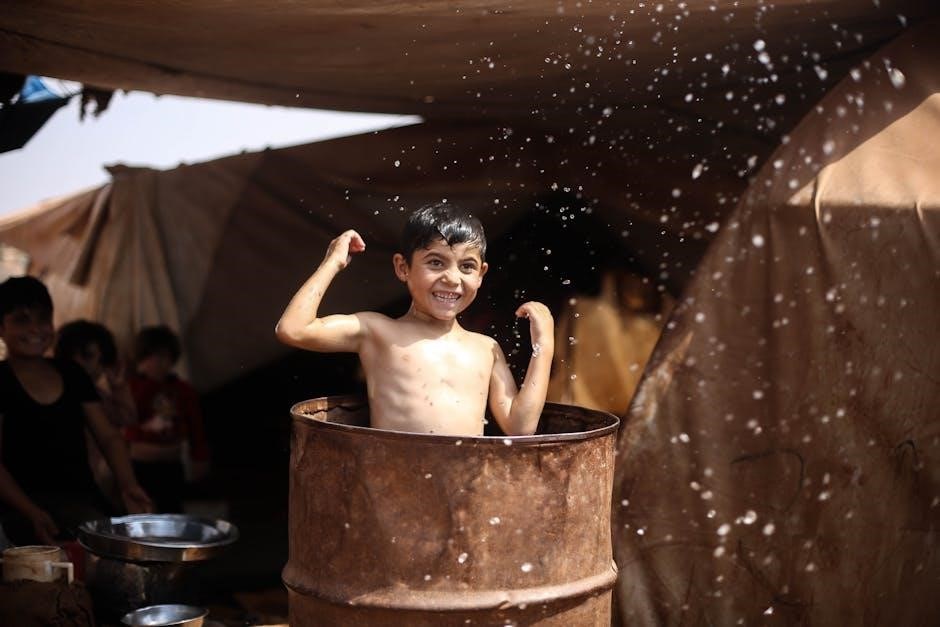the cost of survival pdf

Survival often comes at a price, whether through economic burdens, ethical dilemmas, or personal sacrifices. This text explores the multifaceted costs of survival, examining how individuals and societies navigate life-threatening scenarios, weighing financial expenses, emotional tolls, and moral questions.
Overview of the Book
The book “The Cost of Survival” delves into the intricate balance between survival and its associated expenses, exploring themes of rescue operations, medical expenses, and ethical dilemmas. It examines how individuals and societies allocate resources to save lives, questioning whether those rescued should bear the financial burden. The text also addresses the psychological and emotional toll of survival, highlighting its impact on relationships and mental health. By analyzing real-world scenarios and case studies, the book provides a comprehensive understanding of the economic, social, and personal costs of survival, urging readers to reflect on the value society places on human life. This thought-provoking work is designed to spark critical thinking about the true price of survival in various contexts.

Key Themes and Messages
The book The Cost of Survival explores the delicate balance between survival and its associated expenses, emphasizing the moral and financial trade-offs society faces. It questions whether individuals who voluntarily risk their lives should bear the costs of their rescues, sparking debates about personal responsibility and societal obligation. The text also highlights the psychological and emotional burdens of survival, such as post-traumatic stress and strained relationships. By examining these themes, the book challenges readers to consider the true value of human life and the ethical dilemmas surrounding resource allocation. Its central message is that survival is not just a physical act but also a financial and emotional one, with far-reaching consequences for individuals and communities alike.

Economic Impact of Survival
The financial burden of survival is significant, encompassing rescue operations, medical treatments, and long-term care costs, which can strain individuals, families, and societal resources alike.
Costs of Rescue Operations
Rescue operations involve significant financial burdens, encompassing costs for personnel, equipment, and medical care. Helicopters, specialized teams, and prolonged rescue efforts can accumulate expenses reaching thousands of dollars. These costs often fall on taxpayers and insurance systems, raising ethical questions about who should bear the financial responsibility. The debate centers on whether individuals who voluntarily engage in risky activities should cover the costs of their rescues. This ethical dilemma highlights the tension between public responsibility and personal accountability. The financial burden of rescue operations underscores the need for policies that balance fairness and safety, ensuring that both survivors and society can navigate these challenges equitably.
Medical Expenses and Treatment Costs
Medical expenses and treatment costs play a crucial role in the overall cost of survival, often imposing significant financial burdens on individuals and healthcare systems. Life-saving treatments, such as chemotherapy, surgeries, and prolonged hospital stays, can accumulate costs into tens of thousands of dollars. Studies have shown that the cost-effectiveness of certain treatments varies widely, with some offering minimal benefits at high prices. For instance, the cost-effectiveness ratio for progression-free survival in cancer treatments highlights the balance between extending life and financial strain. These expenses not only affect patients but also impact their families, leading to long-term financial challenges and reduced quality of life. The economic toll of medical care underscores the need for equitable healthcare solutions.

Social and Ethical Considerations
The cost of survival raises ethical dilemmas, balancing life preservation with resource allocation. Society grapples with who should bear these expenses, sparking debates on fairness and responsibility.
Should Individuals Pay for Their Own Rescues?
Debates arise over whether individuals should cover rescue costs, especially for voluntary risks like mountain climbing or base jumping. Proponents argue personal responsibility, while opponents emphasize societal duty to protect lives, highlighting ethical and financial tensions.
Ethical Dilemmas in Allocating Resources

Allocating resources for survival raises ethical challenges, particularly in balancing individual needs versus societal benefits. Decisions often involve tough choices, such as prioritizing patients based on survival chances or cost-effectiveness, creating moral conflicts in healthcare and rescue operations.

Medical and Health Aspects
Medical and health aspects emphasize the economic challenges of life-saving treatments, balancing costs with survival benefits and long-term quality of life for patients.

Cost-Effectiveness of Life-Saving Treatments
The cost-effectiveness of life-saving treatments is a critical factor in medical decision-making. Studies reveal that while advanced therapies can extend survival, their high costs often strain healthcare systems. For instance, treatments like granulocyte colony-stimulating factor for uterine leiomyosarcomas and certain colorectal cancer therapies show varying degrees of cost-effectiveness. Transition probabilities and utilities from published sources highlight the balance between survival benefits and financial burdens. Incremental cost-effectiveness ratios help determine whether treatments provide value for their cost. Despite improvements in progression-free survival rates, the economic impact on patients and systems remains significant, raising ethical questions about resource allocation and access to care.
Quality of Life vs. Survival Costs
Balancing quality of life with survival costs is a poignant challenge. Treatments that extend life may significantly impair a patient’s well-being, creating a trade-off between quantity and quality. Studies on colorectal cancer survivors highlight long-term effects of treatment, including pain and reduced quality of life. Similarly, patients with chronic kidney disease face substantial healthcare costs that affect their lifestyle. The emotional and physical toll of prolonged treatments often raises questions about whether extending survival justifies the diminished quality of life. This dilemma underscores the need for personalized approaches, considering both medical and personal priorities, to ensure that survival efforts align with patients’ values and overall well-being. This balance is crucial for ethical healthcare decision-making.

Psychological and Emotional Toll
Survival often exacts a profound psychological and emotional toll, leading to post-traumatic stress, mental health struggles, and strained relationships, as individuals grapple with the aftermath of life-threatening experiences.
Post-Traumatic Stress and Mental Health
Survival often leaves lasting psychological scars, with many individuals experiencing post-traumatic stress disorder (PTSD), anxiety, and depression. The emotional burden of life-threatening events can disrupt daily life, strain relationships, and impair mental well-being. Studies highlight that survivors frequently struggle with flashbacks, nightmares, and heightened vigilance, underscoring the profound impact of trauma. The cost of survival extends beyond physical recovery, as mental health challenges require ongoing treatment and support. Addressing these issues is crucial for helping individuals rebuild their lives and achieve long-term emotional resilience in the face of adversity.
The Cost of Survival on Relationships
Survival can profoundly strain personal relationships, as the emotional and psychological toll of life-threatening experiences often creates distance and misunderstanding. Survivors may struggle with feelings of isolation, as others cannot fully grasp their ordeal, leading to strained communication and emotional disconnection. Additionally, the financial burden of survival efforts can place pressure on family and friends, further complicating relationships. While some relationships may strengthen through shared resilience, others may fracture under the weight of unaddressed trauma. The cost of survival, therefore, extends beyond the individual, affecting loved ones and highlighting the importance of support systems in fostering recovery and rebuilding connections.
Real-World Applications
Rescue operations, medical expenses, and community support systems highlight the practical implications of survival costs, emphasizing the need for sustainable solutions to mitigate financial and emotional burdens.
Case Studies of Survival Scenarios
Real-world survival scenarios, such as mountain climbers requiring rescue or base jumpers suffering injuries, illustrate the financial and emotional burdens of survival. Rescue operations involving police, fire departments, and medical teams highlight the economic costs, while survivors often face long-term medical expenses. Community support systems, like survivor funds and flexible cash payments, play a crucial role in aiding recovery. These examples underscore the complex interplay between immediate survival needs and the lasting impact on individuals and society, emphasizing the importance of sustainable solutions to mitigate these costs and ensure equitable access to life-saving resources. Such cases provide valuable insights into the practical challenges of survival.

Community and Government Support Systems
Community and government support systems play a vital role in mitigating the cost of survival by providing essential resources. Emergency services, healthcare, and mental health support are critical in aiding survivors. Programs like survivor funds and flexible cash payments help individuals regain stability. Governments and organizations also offer social services, ensuring access to necessary aid. These systems reduce the financial and emotional burden on survivors, fostering recovery and resilience. By addressing both immediate and long-term needs, they create a safety net that helps individuals and communities navigate survival challenges effectively, promoting equitable access to support and resources. These efforts are indispensable in lessening the overall cost of survival.
The cost of survival is a multifaceted issue, balancing financial, ethical, and emotional burdens. Ultimately, the value of human life often outweighs measurable expenses, emphasizing its immeasurable worth.
Final Thoughts on the Cost of Survival

Survival’s cost is a complex interplay of financial, ethical, and emotional burdens. While rescue operations and medical treatments save lives, they often come with significant expenses. Individuals and societies must weigh the value of life against resource allocation, raising profound moral questions. The psychological toll on survivors and their relationships further complicates the equation. Yet, despite these challenges, the inherent worth of human life often justifies the costs. Moving forward, it is crucial to balance economic realities with compassion, ensuring that survival remains accessible without overwhelming financial or emotional strain. The cost of survival is not just monetary; it is a reflection of our collective values and priorities.
Call to Action for Readers
As we reflect on the cost of survival, it is imperative to consider our role in shaping a more equitable and compassionate future. Readers are urged to advocate for policies that balance resource allocation with ethical considerations, ensuring that survival is not solely a privilege of the wealthy. Support organizations that assist survivors in rebuilding their lives and mental health. Engage in conversations about the moral dilemmas surrounding rescue operations and medical treatments. By taking these steps, we can collectively work toward a world where survival is not just a costly endeavor but a fundamental right accessible to all. Let us act with empathy and responsibility to create meaningful change.



Leave a Reply
You must be logged in to post a comment.